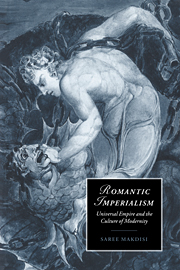Book contents
- Frontmatter
- Contents
- Preface and acknowledgments
- 1 Introduction: Universal Empire
- 2 Home imperial: Wordsworth's London and the spot of time
- 3 Wordsworth and the image of Nature
- 4 Waverley and the cultural politics of dispossession
- 5 Domesticating exoticism: transformations of Britain's Orient, 1785–1835
- 6 Beyond the realm of dreams: Byron, Shelley, and the East
- 7 William Blake and the Universal Empire
- 8 Conclusions
- Notes
- Bibliography
- Index
- CAMBRIDGE STUDIES IN ROMANTICISM
1 - Introduction: Universal Empire
Published online by Cambridge University Press: 29 September 2009
- Frontmatter
- Contents
- Preface and acknowledgments
- 1 Introduction: Universal Empire
- 2 Home imperial: Wordsworth's London and the spot of time
- 3 Wordsworth and the image of Nature
- 4 Waverley and the cultural politics of dispossession
- 5 Domesticating exoticism: transformations of Britain's Orient, 1785–1835
- 6 Beyond the realm of dreams: Byron, Shelley, and the East
- 7 William Blake and the Universal Empire
- 8 Conclusions
- Notes
- Bibliography
- Index
- CAMBRIDGE STUDIES IN ROMANTICISM
Summary
The greater part of the world has, properly speaking, no history, because the despotism of custom is complete. This is the case over the whole East.
John Stuart Mill, On LibertyThe Hindu legends still present a maze of unnatural fictions, in which a series of real events can by no artifice be traced. The internal evidence which these legends display, afforded indeed, from the beginning, the strongest reason to anticipate this result. The offspring of a wild and ungoverned imagination, they mark the state of a rude and credulous people, whom the marvellous delights; who cannot estimate the use of a record of past events; and whose imagination the real occurrences of life are too familiar to engage. To the monstrous period of years which the legends of the Hindus involve, they ascribe events the most extravagant and unnatural: events not even connected in chronological series; a number of independent and incredible fictions. This people, indeed, are perfectly destitute of historical records.
James Mill's assessment of India's past in the opening pages of his History of British India (1817–36) establishes the context for the arrival of his own historicizing project and of the larger civilizing mission undertaken by the East India Company. To set to rights the chaos of India's past, and to connect factual events into a diachronic story within a rational, logical, and, above all, historical narrative: this is evidently a significant component of Mill's effort to bring history not only to British India, but to all of India (both geographically and temporally).
- Type
- Chapter
- Information
- Romantic ImperialismUniversal Empire and the Culture of Modernity, pp. 1 - 22Publisher: Cambridge University PressPrint publication year: 1998



